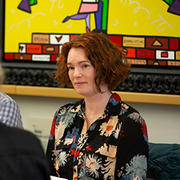

Gene editing has sparked public interest and curiosity, especially due to news of the first-time genetic modification of two twin babies. The scope and ethics of gene editing has long been discussed and debated by experts across the fields of biology, health care, and human rights law. For approximately nine years, scientists have experimented with using the immune system of bacteria to edit genes in other organisms in lab settings. More recently, they have found a way to make these edits in days, as opposed to months. The contentiousness of this topic can be realized through the results of a poll conducted by Pew Research Center in 2016, which showed that 28% of US adults found gene editing—for the purpose of reducing risk of serious disease—morally acceptable, 30% found it morally unacceptable, and 40% were just not sure. The topic of gene editing requires cross-disciplinary discourse to address complex questions such as: At what point is an embryo considered human? Who decides which health risks warrant gene editing, and which ones do not? These and many others were discussed at a recent even at GHELI titled Gene Editing: Ethics, Rights, and Health Equity Issues. This event was moderated by one of GHELI’s Senior Scholars in Residence, Professor Alicia Ely Yamin, and was held in collaboration with the Global Health and Rights Project at Petrie-Flom and the Center for Genetics and Society.
Executive Director of the Center for Genetics and Society, Marcy Darnovsky, laid the groundwork for the roundtable discussion and presented on somatic gene editing, which targets and modifies the functioning of specific cells—blood cells, for example. Increasingly accepted in the medical field, this patient treatment is classified as gene therapy, and is currently used to treat debilitating illnesses, such as Parkinson’s disease. Germline gene editing has become a contemporary controversial subject, due to the difficult issues and questions that arise. This type of genetic alteration completely modifies embryos, and these new genes get passed on to future generations, arguably having greater, far-reaching consequences.
Attendees engaged in a candid conversation about the implications of this new technology, and many expressed concerns regarding the biological manifestation of social inequity. Would this technology be exclusively accessible to higher-income communities? Would the “best” genomes go to the most privileged? The attendees questioned how one can combat massive social inequities that are not presenting themselves visibly, but in minute human genomes. Although this alternate future, now our present-day actuality, has been explored by scientists, writers, and philosophers in the past, the event illuminated the intersection of many complicated questions and considerations that will require further expanded, multi-sectoral conversation from all perspectives.
The U.S. National Academies and the U.K.’s Royal Society formed an international commission in May 2019 to assess the potential clinical use of germline gene editing. While it’s clear that large-scale, broader public discussion and awareness remains a priority, this GHELI event played an important role in facilitating conversation among scholars and activists in the Boston area, as well as serving as a space to foster a greater understanding on genetics. As reproductive and human rights are being challenged domestically and internationally, society will need to see how genetic engineering fits into the questions that professionals across sectors are trying to address.